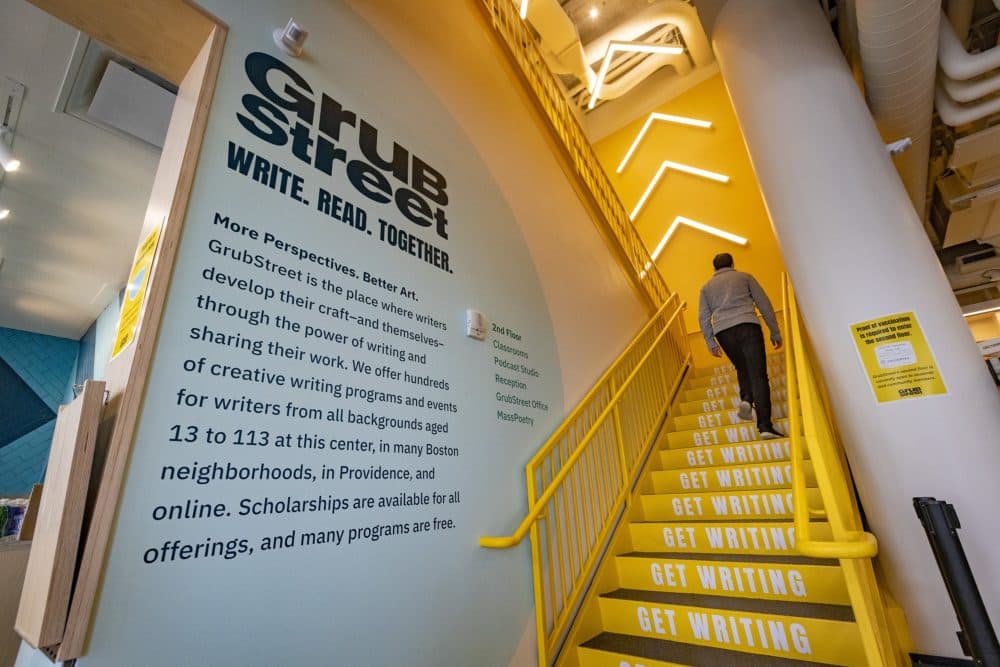Advertisement
Author at the center of 'Bad Art Friend' controversy leaves GrubStreet following review

Sonya Larson, one of the writers at the center of the viral New York Times Magazine article “Who Is the Bad Art Friend?,” has stepped down from her position at the Boston writing center GrubStreet, where she ran the organization’s annual conference.
One other staff member, director of online learning Alison Murphy, also stepped down.
The departures of Larson and Murphy follow a third-party review, conducted by the law firm Locke Lord, of GrubStreet’s actions, practices and policies. The review was triggered by revelations in court documents that were released as part of a legal dispute between Larson and another GrubStreet-affiliated writer, Dawn Dorland. The investigation also examined a human resources complaint submitted to GrubStreet by Dorland in 2018. Locke Lord found that the complaint had been handled appropriately by GrubStreet at the time.
The results of the review were announced in an email to the GrubStreet community from the organization’s executive director, Eve Bridberg, and the board.
“We are truly sorry for the ways in which we didn’t live up to our values as an organization,” the statement read, in part. Bridberg declined to be interviewed for this article.
The legal conflict between Larson and Dorland, who, the Times reported, met at GrubStreet eight years ago, became a source of public fascination after the publication of “Who Is the Bad Art Friend?” in early October. The article, by Robert Kolker, details Dorland’s decision to donate a kidney to a stranger as part of an organ transplant chain – and Larson’s decision to write a short story, “The Kindest,” that appeared to be based on Dorland’s donation. At the center of the legal dispute is Dorland’s accusation that Larson plagiarized a letter Dorland wrote to the final recipient in the donation chain. Larson denied plagiarizing the letter and maintained that “The Kindest” was a work of fiction only loosely inspired by Dorland’s kidney donation.
The polarizing article prompted readers to debate which of the women was the true villain (or victim). Some saw Dorland as attention-seeking and vindictive, while others thought Larson was manipulative and opportunistic. The article also prompted an argument around the limits of artistic license.
Of possible concern to GrubStreet’s investigation are correspondences between Larson and members of her Boston-based writing group, some of whom were GrubStreet staff, that were released as part of discovery in the legal battle. (GrubStreet writers have occasionally been published on WBUR.) Some of the messages show the group, which calls itself the Chunky Monkeys, reacting to Dorland’s escalating legal and professional incursions against Larson. In one exchange, Murphy writes to Larson that the group will “ice [Dorland] out if she tries to mess with you.” In another, GrubStreet artistic director Christopher Castellani writes of Dorland, “my mission in life is going to be to exact revenge on this pestilence of a person.”
“We acknowledge that comments made by our Artistic Director, Christopher Castellani, have caused distrust and concern in our community. He will be reaching out with a message in the coming days,” GrubStreet said in its statement. The statement also announced that GrubStreet board member Jennifer De Leon, a member of the Chunky Monkeys whose correspondences with Larson appeared in court documents, had stepped down.
“We are committed to doing better as an organization,” GrubStreet said in its statement. “Locke Lord is continuing to advise us by reviewing all of our internal standards to ensure that we strengthen or create policies as needed, including the development of a code of conduct for our staff and instructors.”
The statement did not offer specific reasons for Larson, Murphy and De Leon’s departures. But it seemed to hint that the messages exchanged among Chunky Monkey members may have contributed to GrubStreet's decision to launch an investigation.
“There’s no denying that this incident has raised questions about lingering insider/outsider dynamics in our organization that we need to address,” the GrubStreet statement said. It added that the organization plans to hire a firm to examine its internal culture.
